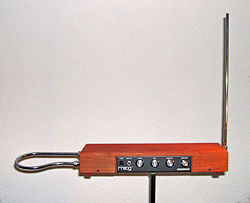Thereminist

An Etherwave-Theremin, assembled from Robert Moog's kit: the loop antenna on the left controls the volume while the upright antenna controls the pitch.
|
|
| Electronic instrument | |
|---|---|
| Hornbostel–Sachs classification | 53 (Electrophone) |
| Inventor(s) | Léon Theremin |
| Developed | 1920 |
The theremin (/ˈθɛrəmɪn/; originally known as the ætherphone/etherphone, thereminophone or termenvox/thereminvox) is an electronic musical instrument controlled without physical contact by the thereminist (performer). It is named after the Westernized name of its Soviet inventor, Léon Theremin (Термéн), who patented the device in 1928.
The instrument's controlling section usually consists of two metal antennas that sense the relative position of the thereminist's hands and control oscillators for frequency with one hand, and amplitude (volume) with the other. The electric signals from the theremin are amplified and sent to a loudspeaker.
The theremin was used in movie soundtracks such as Miklós Rózsa's Spellbound, The Lost Weekend, and Bernard Herrmann's The Day the Earth Stood Still. It has also been used in theme songs for television shows such as the ITV drama Midsomer Murders. This has led to its association with situations. Theremins are also used in concert music (especially avant-garde and 20th- and 21st-century new music) and in popular music genres such as rock.
...
Wikipedia
